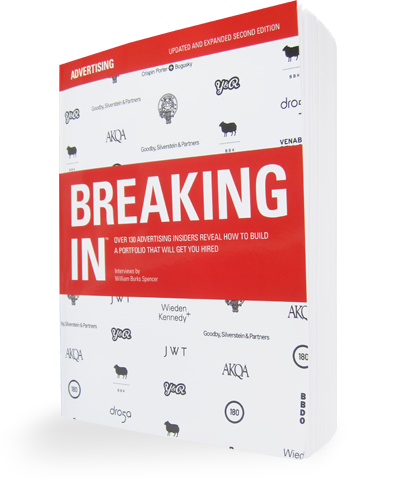Check out the work of Christiano Abrahao.
What do you look for in a student portfolio? And what impresses you?
I used to say that if you remember, it must be good. We see so much stuff everyday that remembering somebody’s work is a great sign. If something comes to mind, at that moment we lay in bed, after a busy day of work, it must definitely tick all the boxes of freshness, relevance, and tension that a great ad should have.
But being more specific, relevance is the word. It’s about understanding people and the common mindset out there. Then whatever you do, it will be relatable. The more honest you are, the closer you’ll be to a true insight. And it’s always the great insight that kills.
Can you think of an example you’ve seen?
A student team once showed me a print campaign they had for a house cleaning company. Each print introduced a performance test people could use to evaluate their cleaners. And for the ones who failed the test, they’d offer their flawless service.
Many years later, there I was having problem with my cleaner. Funny enough I still remembered some of the tests. I followed their advice and did the “pencil test” by hiding it under the sofa. I was surprised to find the pencil at exactly the same place, once the lady left the house.
Are there any common mistakes you see in student portfolios?
Generally speaking, student books look very similar. I think people believe there is a norm they must follow. Everyone get inspired by the same award winning ad campaigns and everyone ends up with the same kind of book. It’s hard to stand out that way. I wish I saw more of the person behind the ads and less of the advertising industry. It’s about creativity after all.
I think detaching from advertising is a good start. There is so much inspiration out there. Choose what you’re feeding your brain. What you give to it will be given back to you. And to be totally honest, I’d rather see in a book a brilliant art project or a brilliant piece of content than another expected idea that solves another boring brief. That brilliant idea might even be right for someone’s brand after all.
What about the level of finish? Can sketches be enough?
Keep it simple. Your goal is to have an insightful idea and make sure someone understands it. So craft helps, but keeping it simple is key. If you don’t have the craft, collaborate with people. There are great people out there that have the craft and don’t have ideas. You can help each other.
What do you think about personal projects? And do you have any examples of great ones that you’ve seen?
The good thing about personal projects is the obvious, it’s personal. It’s easier to do something great when we care about it. And by showing something you care about, you’re showing more of you. The brand here is yourself.
I remember seeing a portfolio of a friend once. He had a lot of good stuff but what really got stuck in my mind was a personal project. We lived in London back then and he used to go around town stealing pictures from tourists. When people were about to take a picture, he’d push them out of the way, take the picture they were about to take and run. It was definitely a pointless idea but it was brilliant at the same time. It told exactly who he was and how ridiculous he was. And most importantly that he was a fun guy to be around.
Do you think copywriters need to demonstrate the ability to write at length?
Do what is right for you. You don’t need to force it if it’s not your thing. You have to be great at one thing and that’s what will be expected from you. There’ll be someone else for the long copy. Don’t force it. Work on your strengths and be honest about your weakness.
Do you have any other advice for students or juniors?
Only show the work you like and identify with. It is more important that people understand who you are and what you believe than having a bunch of things blurring the lines.
People are different out there. Some people will hate your portfolio. Others will love it. Never mind the haters. If you’re honest it’s more likely you’ll fall in a place that is more right for you.
How else can someone improve their portfolio?
Get used to sharing your ideas. Tell them to the taxi driver, to the super of your building or your grandmother. Tell them to real people and listen to what they have to say.
Agencies can be a bubble of convoluted truths. There are so many boxes to tick that we forget to ask ourselves why people would even care about that brilliant idea that had just cracked the brief.
Taking the logo out of your ad can also help. Do the test. Would it still be good if it was out there in the world? That can definitely tell you something. Do whatever you need to get out of the bubble. Your hairdresser should be a better judge than your boss.

Christiano Abrahao

Comments are closed.